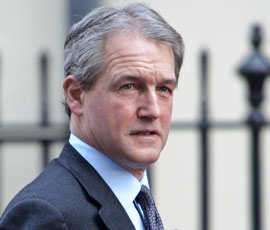Horsemeat: Paterson wants action on meat labelling

DEFRA secretary Owen Paterson will call for stricter country of origin labelling laws for meat when he meets EU ministers to discuss the horsemeat scandal today (Monday 25 February).
The minister will join other agriculture ministers in demanding tougher regulation on country of origin labeling of beef and other meat products.
Clearer country of origin labeling is a key commitment for the government, which wants consumers to have confidence in origin claims being made.
New EU regulation, due to be introduced at the end of the year, will make it compulsory for food companies to declare the origin of fresh meat on labels.
But EU ministers want to extend the regulation to include all products containing meat, including processed meat products.
Mr Paterson will urge ministers to fast-track the legislation when he meets his EU counterparts in Brussels today (Monday).
Speaking ahead of the meeting, he said it was “unacceptable” for any products to be marked as beef when they also contain horsemeat.
“There is more work to be done to find out exactly how this happened and how to make the system much stronger,” he added.
“I will continue to insist on concrete, co-ordinated action right across Europe when I meet European agriculture ministers on Monday.”
On Saturday (23 February), French president Francois Hollande called for greater traceability for meat, including mandatory labeling for processed meat used in ready-made meals
He called on EU ministers to agree tougher legislation on country of origin labeling to prevent a recurrence of the horsemeat scandal.
Earlier this month, a report by the Commons’ Environment, Food and Rural Affairs select committee said the Food Standards Agency and the government had been caught “flat-footed” by the horsemeat scandal.
Anne Macintosh MP said restoring consumer confidence in meat products would “take time and money”, but added that the government had a duty to ensure that food, while remaining affordable, complied with the highest standards of traceability and quality.
The FSA said more than 99% of beef products contained no horse DNA in its second publication of industry test results.
The overwhelming majority, 3,599 (more than 99%) of tests contained no horse DNA above the level of 1%.
Thirty-five results, representing 13 products, contained horse DNA at or above the 1% threshold. These products, including lines from Sodexo, Asda and the Whitbread group, have already been named and withdrawn from sale.
No tests to date on samples containing horse DNA have found the veterinary anti-inflammatory drug phenylbutazone (bute), the FSA said.
“The overwhelming majority of results, over 99%, have come back negative for the presence of horse DNA above the threshold of 1%, which is reassuring for consumers,” said FSA chief executive Catherine Brown.
“However, our work is far from done. The sampling programme being carried out by local authorities on behalf of the FSA is already well under way and we expect to report the initial findings from that work in early March.
“We are also committed to pursuing enforcement action where we can, to ensure that those who were at fault take full responsibility for their actions. We are determined to get to the bottom of this to find out exactly what happened – and to make sure it doesn’t happen again.”
Twenty-nine of 2,501 samples in the food chain tested positive for horsemeat in the first round of DNA testing.
The FSA is extending its testing programme to include a wider range of meat products, such as café sandwiches and kebabs.
Horsemeat scandal latest news
